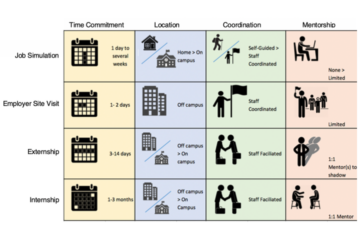Internships
Think flexibly about an internship experience

An internship is an opportunity to explore career pathways, gain experience, and build a network. Some of the benefits include
- The ability to apply the skills you have gained during your Ph.D. studies, such as:
Project management
Teamwork and collaboration
Research, analytics
Communication skills (written, oral)
- Undertaking meaningful projects and discovering stimulating, intellectual conversations in industry, government, non-profits and other sectors in the process
- Understanding workplace culture, norms and expectations
- Opportunities to network, network, network
Read more about the value of test driving with an internship and read “Through Internships, PhD Students Expand their Skills and Explore their Options.” An internship does not necessarily mean a full-time engagement. There are many ways to think flexibly about getting the experience you need on- and off-campus that are compatible with your fellowship, appointment, and visa constraints.
A Win-Win-Win Partnership
Benefits to the participant, their advisor, and the organization are multiple. You should approach the experience with intention to get the most out of the experience. Contact us for guidance on setting yourself up for success.
The participant benefits through professional development, possibly in the areas of corporate communications, project management, commercial application of knowledge, technology, and research methods; and the shoulder-to-shoulder expert guidance by mentors in the outside organization.
The outside organization benefits by tackling back-burner or early validation projects, connection with experts and facilities at Cornell University, a chance to test-drive future employees, and a fresh perspective to advance a venture. An on-campus unit can benefit in many of the same ways. Read about the many reasons why external stakeholders engage with academia for the benefit of doctoral career and professional development.
The advisor benefits from outside input on the development and commercial aspects of the research, connection to experts within the sector, closer alignment with the market need or user constraints, and research insight and inspiration from a different perspective. Contact us if you are seeking to learn about the process of developing an internship.
Learning Outcomes Can Include:
- Describing the workplace culture
- Building new vocabulary for the job
- The ability to explain key challenges of the industry sector
- Confidence in describing your transferrable skills and determining if they align with the career
- Demonstrating new skills to add to your resume
- Deliverables: benefits to your resume and brand, including portfolio samples, published works, project completions, evaluations
- Network: learn career paths, dream job tasks, and make connections across disciplines
Find an Internship
We want to empower you to find the right experience for your needs. Please make an appointment with us to explore the process so you get the most out of the time spent.
- Use search engines and professional societies in your field or targeted sector
- Create your own opportunity
- Identify organizations that align with your values and career goals (use the LibGuide!)
- Reach out to alumni (we can help connect you!)
- When attending a conference or event, connect with the speaker and broach the topic of an internship
Many Career Possibilities
To explore and refine your search for the right next career step for you, please consult the resources we have assembled in partnership with Cornell Library at the Careers Beyond Academia LibGuide.
There are many federal and New York State government agencies, offices, and services in the area of governance, risk, and compliance that employ individuals with Ph.D.s. In addition, governance can include running programs within academic environments (e.g. in core facility management, executive directors, as center directors or program managers). Whether you’d like to work for a think tank, a non-profit, in industry, or start your own enterprise, we can help you plot a path to your success.
Approach Your Advisor
Read advice from a postdoc on how to approach your advisor.
- Honesty and communication are vital!
- Talk about your career and professional goals alongside your research goals early on.
- Lay out the facts about how an internship will add value to your brand, as well as the work that you are doing on campus.
- In advance, think about:
- Timing: How do you fulfill your campus commitment? When does an internship best align with your studies? How long do you need to accomplish your professional development goals?
- Budget: Some internships are paid, others not. Plan and budget. Internships that are structured as employment exceeding 20 hours per week may require that you pause your student status with a short leave of absence.
- Funding: Be sure you are eligible for the experience, agree to a timeline, and document in writing any impacts to your original funding plan with your advisor and field. Double check the implications of the internship experience by reading university Policy 1.3. If you hold an assistantship or fellowship, a paid internship may be limited to 5-8 hours/week.
- Always be informed about how part time work may impact your situation.


